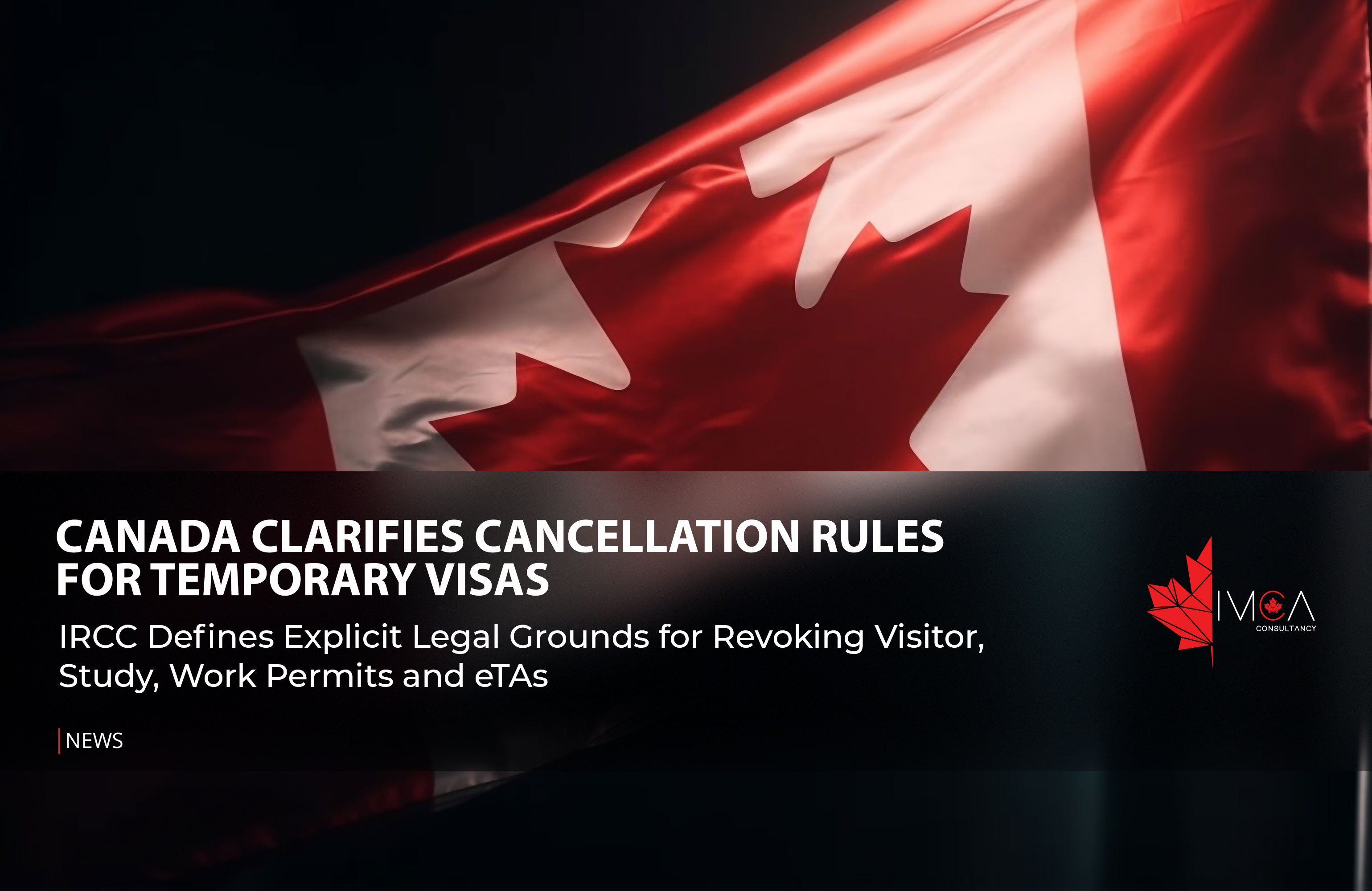Canada Clarifies Cancellation Rules for Temporary Visas

On November 4, 2025, Immigration, Refugees and Citizenship Canada (IRCC) issued updated guidance defining when visitor visas, electronic travel authorizations (eTAs), study permits, and work permits can be cancelled. The revisions clarify officers’ powers and create explicit legal bases for revocation under the Immigration and Refugee Protection Regulations (IRPR).
Visitor Visa (TRV) Cancellations
Sections 180.1 and 180.2 now authorize IRCC officers to cancel temporary resident visas on seven discretionary and four automatic grounds.
Discretionary grounds:
-
Administrative error: Visa issued mistakenly by an officer.
-
Inadmissibility: Holder becomes criminally or medically inadmissible after issuance.
-
Eligibility failure: Applicant fails to meet section 179 requirements or no longer qualifies (e.g., lost job supporting visit).
-
Subsequent TRP issued: Prevents dual status conflicts.
-
Failure to depart: Reasonable belief the person will not leave Canada at end of stay.
-
Subsequent refusal: Later refusal of another document (eTA, work, study, or visa) can justify cancellation.
-
Security or misrepresentation: Declaration under section 22.1(1) for security or fraud reasons.
Automatic cancellations:
A TRV is void if the holder:
-
Becomes a permanent resident,
-
Loses or abandons the passport used for issuance, or
-
Dies.
Example: A visitor who loses their job and is later refused a work permit may have their TRV cancelled under section 180.1(e).
Electronic Travel Authorization (eTA) Cancellations
Sections 12.07 and 12.08 explicitly define eTA cancellation authority.
Discretionary grounds:
-
Inadmissibility: New criminal record or medical issue.
-
Ineligibility: No longer qualifies under section 12.06 (e.g., passport change).
-
Administrative error: Issued by mistake due to incorrect data.
Automatic cancellations:
-
Holder becomes a permanent resident,
-
Passport linked to the eTA is lost or replaced,
-
Holder dies.
Example: A French traveller convicted abroad loses eTA validity under 12.07(a). Renewing a passport without reapplying for a new eTA voids the old one under 12.08(b).
Study Permit (SP) Cancellations
Authorities under IRPR 222.7 and 222.8 now clearly define when study permits can be revoked.
Discretionary ground:
-
Administrative error: Issued mistakenly (e.g., missing acceptance proof, ineligible DLI).
Automatic cancellations:
-
Becoming a permanent resident, or
-
Death.
Example: If a school on compliance hold was mistakenly approved, IRCC may cancel related permits under 222.7. Fraudulent documentation, such as fake language tests, also qualifies. Officers can review permits if students or schools breach conditions.
Work Permit (WP) Cancellations
Sections 209.01 and 209.02 establish similar rules for work permits.
Discretionary ground:
-
Administrative error: Issued without proper employer or LMIA verification.
Automatic cancellations:
-
Holder becomes a permanent resident, or
-
Holder dies.
Example: A work permit tied to a non-compliant employer can be cancelled under 209.01. A post-graduation work permit automatically expires upon the holder obtaining permanent residence.
Key Changes from Previous Rules
|
Aspect |
Old Rules |
New Rules (2025) |
|
Legal clarity |
Relied on general powers |
Explicit legal sections define grounds |
|
Transparency |
Often unclear |
Publicly listed criteria (180.1, 12.07, 209.01, 222.7) |
|
Applicant protection |
Limited |
Predictable and subject to judicial review |
|
System integrity |
Ambiguous |
Reinforced with structured oversight |
These updates align Canada’s cancellation framework with countries like the U.S. and Australia, ensuring consistent enforcement and fairness.
Broader Policy Context
The changes support IRCC’s modernization goals, including:
-
Strengthened post-entry compliance checks,
-
Data-sharing across border and immigration systems,
-
Prioritization of applicants with clear intent to leave, and
-
Stricter eligibility for study and work permits.
By codifying cancellation conditions, IRCC aims to maintain lawful temporary stays and reduce ambiguity for officers and applicants.
Policy Safeguard: Waiver Clause
A fairness clause prevents cancellation if the document was originally issued under a temporary public policy waiver. For instance, humanitarian approvals for Ukrainians cannot be cancelled solely for missing documents initially waived.
Practical Scenarios
-
Visitor visa refusal after approval:
A visitor refused a subsequent work permit may have their TRV cancelled under sections 180.1(d) and (e).
-
Expired passport:
An eTA tied to an expired passport becomes invalid under section 12.08(b).
-
Institutional fraud:
Study permits linked to falsified college admission letters can be cancelled under 222.7.
-
Employer non-compliance:
Work permits associated with an unauthorized employer can be revoked under 209.01.
-
Becoming a permanent resident:
On obtaining permanent residence, all temporary documents (TRV, WP) are automatically cancelled under sections 180.2 and 209.02.
Comparison With Bill C-12
|
Feature |
IRCC Cancellation Rules |
Bill C-12 |
|
Legal basis |
IRPR regulatory changes |
Federal legislation amending multiple acts |
|
Focus |
Specific cancellation of TRV, eTA, WP, SP |
System-wide immigration and border integrity reform |
|
Impact |
Directly affects temporary residents |
Broader institutional authority and enforcement |
|
Scope |
Defined grounds by document type |
Includes suspension and system-level powers |
|
Status |
In effect (Nov 2025) |
Introduced Oct 2025, second reading completed Oct 23 |
|
Purpose |
Clarifies and enforces compliance |
Strengthens national border management framework |
Policy Significance
These updates reinforce administrative consistency in managing temporary residents. They provide officers with defined criteria for revocation, improve fairness, and increase transparency.
The framework strengthens program credibility by deterring misuse and clarifying expectations for lawful temporary stays. It also standardizes enforcement to avoid arbitrary cancellations while supporting responsible immigration management amid high temporary resident volumes.

